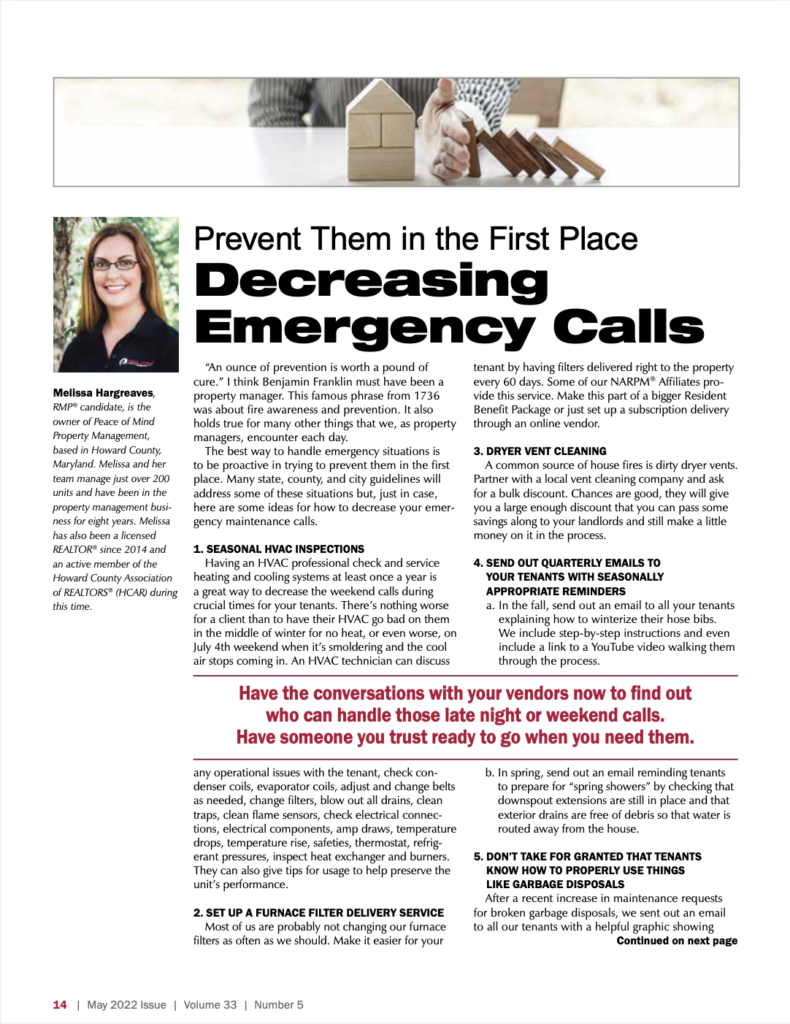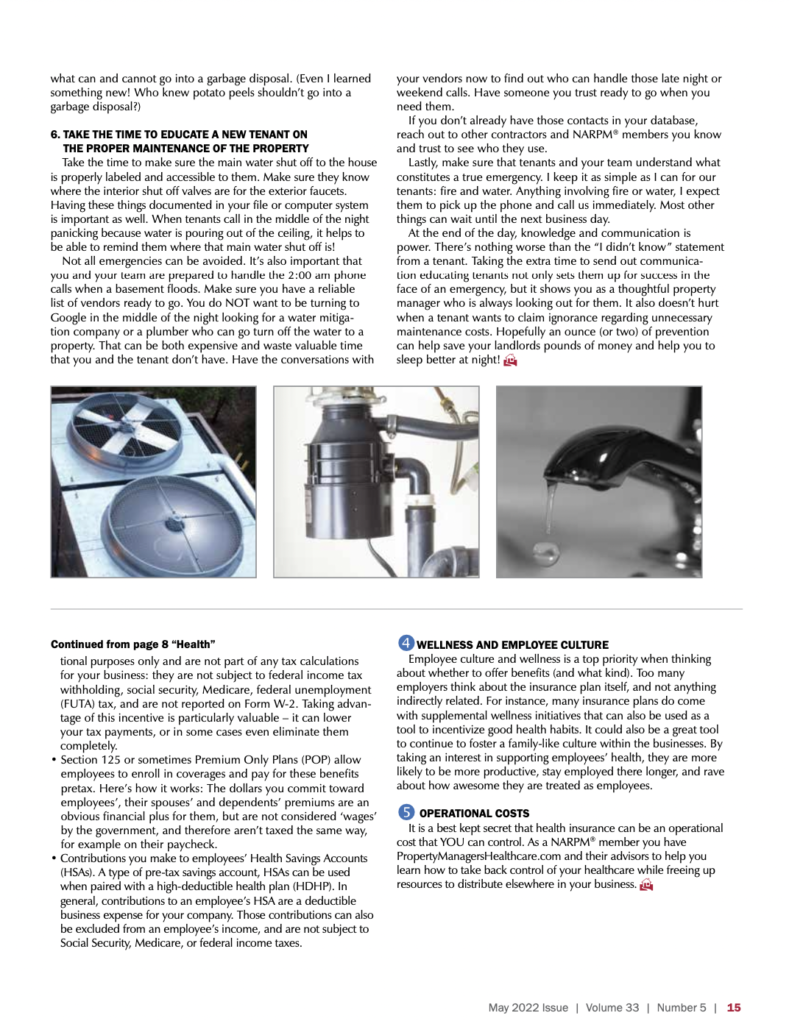Prevent Emergency Calls in the First Place
“An ounce of prevention is worth a pound of cure.” I think Benjamin Franklin must have been a property manager. This famous phrase from 1736 was about fire awareness and prevention. It also holds true for many other things that we, as property managers, encounter each day.
The best way to handle emergency situations is to be proactive in trying to prevent them in the first place. Many state, county, and city guidelines will address some of these situations. But, just in case, here are some ideas for how to decrease your emergency maintenance calls.
Tips to Decrease Emergency Calls from Tenants
-
Seasonal HVAC Inspections
Have an HVAC professional check and service heating and cooling systems at least once a year. This is a great way to decrease the weekend calls during crucial times for your tenants. There’s nothing worse for a client than to have their HVAC go bad on them in the middle of winter for no heat, or even worse, on July 4th weekend when it’s smoldering and the cool air stops coming in.
An HVAC technician can discuss any operational issues with the tenant. They can check condenser coils and evaporator coils; adjust and change belts as needed; change filters; blow out all drains; clean traps; clean flame sensors; check electrical connections, electrical components, amp draws, temperature drops, temperature rise, safeties, thermostat, refrigerant pressures; and inspect heat exchanger and burners. They can also give tips for usage to help preserve the unit’s performance.
-
Set Up A Furnace Filter Delivery Service
Most of us are probably not changing our furnace filters as often as we should. Make it easier for your tenant by having filters delivered right to the property every 60 days. Some of our NARPM® Affiliates provide this service. Make this part of a bigger Resident Benefit Package or just set up a subscription delivery through an online vendor.
-
Dryer Vent Cleaning
A common source of house fires is dirty dryer vents. Partner with a local vent cleaning company and ask for a bulk discount. Chances are good, they will give you a large enough discount that you can pass some savings along to your landlords and still make a little money on it in the process.
-
Send Out Quarterly Emails to Your Tenants with Seasonally Appropriate Reminders
In the fall, send out an email to all your tenants explaining how to winterize their hose bibs. We include step-by-step instructions and even include a link to a YouTube video walking them through the process.
In the spring, send out an email reminding tenants to prepare for “spring showers.” They should check that downspout extensions are still in place. They should also check that exterior drains are free of debris so that water is routed away from the house.
-
Don’t Take for Granted that Tenants Know How to Properly Use Things Like Garbage Disposals
After a recent increase in maintenance requests for broken garbage disposals, we sent out an email to all our tenants with a helpful graphic showing what can and cannot go into a garbage disposal. (Even I learned something new! Who knew potato peels shouldn’t go into a garbage disposal?)
-
Take the Time to Educate a New Tenant on the Proper Maintenance of the Property
Take the time to make sure the main water shut off to the house is properly labeled and accessible to them. Make sure they know where the interior shut off valves are for the exterior faucets. Having these things documented in your file or computer system is important as well. When tenants call in the middle of the night, panicking because water is pouring out of the ceiling, it helps to be able to remind them where that main water shut off is!
Be Prepared for Property Management Emergency Calls
Not all emergencies can be avoided. It’s also important that you and your team are prepared to handle the 2:00 am phone calls when a basement floods. Make sure you have a reliable list of vendors ready to go. You do NOT want to be turning to Google in the middle of the night looking for a water mitigation company or a plumber who can go turn off the water to a property. That can be both expensive and waste valuable time that you and the tenant don’t have. Have the conversations with your vendors now to find out who can handle those late night or weekend calls. Have someone you trust ready to go when you need them.
If you don’t already have those contacts in your database, reach out to other contractors and NARPM® members you know and trust to see who they use.
Communicate What Constitutes an Emergency
Lastly, make sure that tenants and your team understand what constitutes a true emergency. I keep it as simple as I can for our tenants: fire and water. Anything involving fire or water, I expect them to pick up the phone and call us immediately. Most other things can wait until the next business day.
At the end of the day, knowledge and communication is power. There’s nothing worse than the “I didn’t know” statement from a tenant. Taking the extra time to send out communication educating tenants not only sets them up for success in the face of an emergency, but it shows you as a thoughtful property manager who is always looking out for them. It also doesn’t hurt when a tenant wants to claim ignorance regarding unnecessary maintenance costs. Hopefully an ounce (or two) of prevention can help save your landlords pounds of money and help you to sleep better at night!
This article by Melissa Hargreaves was originally published in the May 2022 issue of NARPM‘s monthly news magazine, pages 14 and 15.



